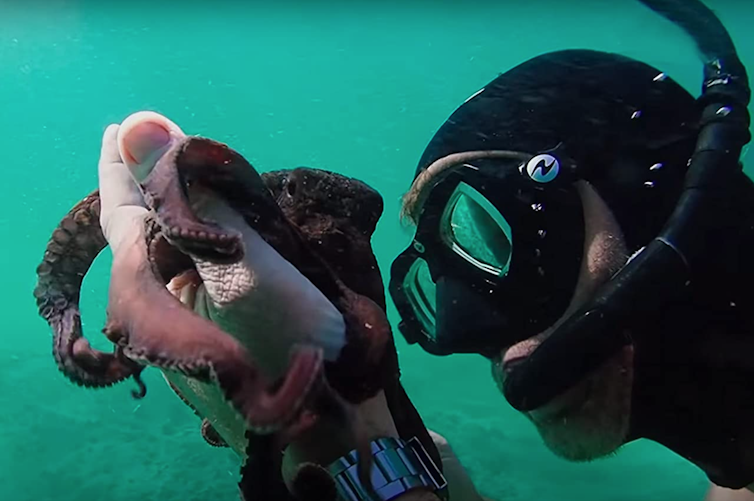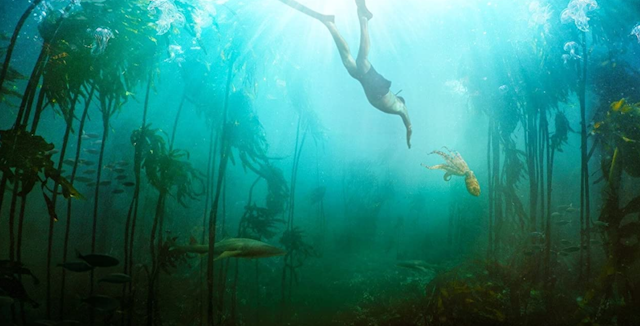With three hearts, blue blood, no bones and eight limbs attached to a bulbous head, octopuses seem like they’re from another planet. But in My Octopus Teacher, the hugely popular nature documentary on Netflix, these cephalopods as not only presented as remarkable — but relatable.
The documentary seeks to evoke empathy by telling a story about the bond between a human and a wild octopus off the coast of Cape Town, South Africa.
Burnt out film maker Craig Foster seeks solace in the ocean. He gains the trust of an octopus through daily visits to her world, and presents an engrossing story of her short life and its impact on him.
As a group of conservation social scientists researching how people relate to the natural world, we are curious about what this type of storytelling might mean for wildlife conservation. Let’s look at what the research says.
Empathy with non-humans
Scientific literature is increasingly recognising the importance of storytelling in science, including to help people empathise with the natural world and build support for conservation.
Stories encourage empathy by helping people experience events from the perspective of others. One feels and responds to the world through anothers’ “eyes” — or tentacles — and this shift of viewpoint is linked to the feeling of being transported to “another world”.
Read more: Understanding others' feelings: what is empathy and why do we need it?
My Octopus Teacher transports viewers to the world of an amazing kelp forest, where one may sense trust and intimacy as the octopus wraps her tentacles around the narrator’s finger. Or distress as the octopus is hunted by a shark. And joy as she cleverly evades the threat.
In fact, research shows empathising with other animals or plants can promote positive relationships between humans and wildlife.
A 2007 experiment, for example, asked people to view photographs of an injured bird or felled tree and to either imagine how the bird or tree felt or to view the photographs objectively.
At the end of the experiment, people who empathised were more likely to express concern for the bird or tree and donate to an environmental charity.
Portraying an octopus as ‘human-like’ can be tricky
But stories that engage empathy can still bring challenges for conservation. One reason relates to concerns about anthropomorphism — ascribing human characteristics to things other than humans.
Some viewers may see this in, for instance, the narrator’s suggestion the octopus “dies for her offspring” or “suffers” from losing an arm.
The relationship between anthropomorphism and conservation is hotly debated.
Some scientists say anthropomorphism distorts scientific knowledge.
For marine biologist Zoë Doubleday in an interview with Australian Geographic, the suggestion the octopus “dies for her offspring” implies a moral decision rather than a biological imperative, which was among the parts of the film she sees as anthropomorphic.
Others warn against imposing human ways of seeing the world onto nature. Human ideas of social interaction may cloud the way viewers interpret scenes of the octopus resting on Foster’s chest, leaving what the octopus actually seeks with such behaviour unexplored.
On the other hand, there are arguments that “appropriate anthropomorphism” can promote conservation. Showing an octopus is intelligent or feels pain would be considered appropriate as it’s consistent with scientific understanding, and could raise awareness of an animal that rarely features in conservation campaigns.
Research from the US earlier this year suggests people who attribute “human-like” qualities of free will and emotions to animals are more likely to place value on humans and wildlife co-existing — a key conservation goal.

The slippery boundary between humans and non-humans is at the heart of My Octopus Teacher. But as viewers respond in different ways to how animals are depicted in stories, where we “draw the line in the sand” depends on individual values and cultural norms.
From empathy to action
Another challenge in using stories to promote conservation relates to whether empathy actually promotes action.
Empathy can cause distress if there’s no clear way to act in response to those feelings. So it’s worth reflecting on the lack of any obvious “call to action” in My Octopus Teacher — the film doesn’t explicitly ask us to donate money or change our behaviour such as what we eat.
We do learn from the epilogue that Craig Foster went on to establish The Sea Change Project to raise awareness of South Africa’s kelp forest. But the viewer is largely left to draw their own conclusions about how to respond to the empathy evoked.
Empathy can also lead to people backing the welfare of familiar species over less relatable — but still important — ones. For example, viewers may be less concerned for the welfare of the many pyjama sharks that hunt the octopus.
Some conservation scientists argue empathy should not be a moral code for conservation since it could undermine support for some actions that protect ecosystems, such as killing invasive, but charismatic, species like feral horses and cats.
Read more: One cat, one year, 110 native animals: lock up your pet, it's a killing machine
This isn’t much of a risk in My Octopus Teacher, which actually says a lot about the importance of ocean ecosystems as a whole. The narrator talks about his re-found love for the ocean, its wildness, and the connections he observes between animals and plants.
Even so, these connections to the wider system may be outshone by the compelling story of one human and one octopus.
Stories for conservation
We conclude the emotive approach to storytelling used in My Octopus Teacher could be positive for wildlife conservation. There is certainly evidence that empathy can drive concern for wildlife as well as positive action.
The impact on conservation will, however, depend on how viewers respond to the emotive qualities of the story. Do they dismiss it as overly sentimental, feel empathy for just one octopus, or concern for the ocean ecosystem she inhabits? It will also depend on whether viewers can imagine positive ways to act on their feelings.
Read more: People are 'blind' to plants, and that's bad news for conservation
We think the world needs more stories like My Octopus Teacher. We encourage conservationists to communicate through stories, making sure these stories evoke empathy not only for individual animals and plants but for whole communities of living beings, and that they suggest multiple pathways for conservation action.
And we hope many more people will watch and discuss this wonderful film, that viewers might “slowly start to care about all the animals” as Craig Foster did, and consider acting on their empathy‚ for example, by donating to marine conservation organisations or buying certified sustainable seafood.

